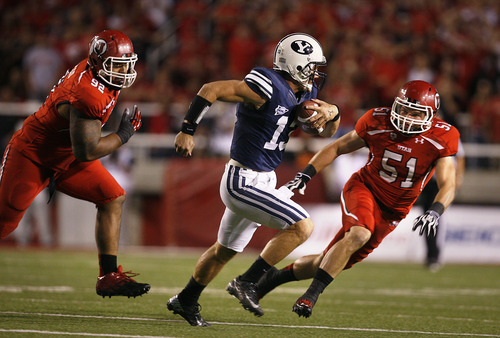This is an archived article that was published on sltrib.com in 2013, and information in the article may be outdated. It is provided only for personal research purposes and may not be reprinted.
We don't know yet what network will telecast the Utah-at-BYU football game on Sept. 21.
But don't be surprised if that network has four letters in it. Like maybe an E, an S, a P and an N. Possibly with a 2 or a U at the end.
It's not official. It's not 100 percent guaranteed. But, unofficially, the word is that it's going to happen.
We don't know what network will air the BYU-Utah games in '16, '17 or '18, either. But you won't lose money if you bet that all of them will be on ESPN networks.
The worst-case scenario is that the games in Provo will be on BYUtv and the games in Salt Lake City will be on the Pac-12 Network. And by 2016, maybe P12N will be in as many homes as BYUtv.
It's not going out on a limb to predict that ESPN will pick up these games. In one form or another, ESPN has aired every Utes-Cougars football game it could get its hands on in the past couple of decades. That includes ESPN, ESPN2, ABC and ESPN regional.
That's every year but the 2006-2010 unpleasantness, when BYU and Utah were both in the Mountain West Conference and that league had games on The Mtn. and CSTV/CBSSN.
We live in an age when TV is more important to college sports than fans in the stands. When TV decides what's important and what's not.
When it comes to sports on TV, nothing is bigger than ESPN. And ESPN has definitely decided that the BYU-Utah rivalry is important.
Nice to see that message made it up to the University of Utah, and that after the two-year gap in 2014 and 2015 the rivalry is back on track for at least three years.
It's not that television has been altogether good for college football. TV has driven conference realignment, which has destroyed a chunk of the tradition that made college football special.
James Bates — who called five Cougar-Ute games from 2006-2010 and captained Florida's 1996 national championship team — was blunt about Utah's decision to leave BYU off its schedule for two years.
"I absolutely hate it," he said. "There are some great rivalries from coast to coast that are just going by the wayside. It just shows that it's really turned into a money deal and traditions don't matter so much anymore. And I just think it's very sad."
You can't argue that Utah isn't in a better place in the Pac-12. Well, you could make that argument — but you'd be insane. It would be difficult to argue that Texas A&M isn't in a better place in the SEC.
But there has been a price to pay. The interruption of the Utah-BYU rivalry. The end of the Texas-Texas A&M rivalry for the foreseeable future. And there are other traditions that may either end or be interrupted. Kansas and Missouri are in different leagues. Scheduling issues from expanded leagues may mean traditional rivals like Florida and Tennessee won't meet annually anymore.
But locally, it's the interruption of the BYU-Utah rivalry that hurt.
"I hate it for the people," Bates said. "I hate it for the kids who grew up dreaming of playing in that rivalry.
"Yeah, there are a lot of guys who will live out a dream of going and playing big-time college football. But it's not the same. There are big games that they'll play every weekend, but none are as big as that one for a lot of these people."
Again, it's nice that message has gotten through.
Scott D. Pierce covers television for The Salt Lake Tribune. Email him at spierce@sltrib.com; follow him on Twitter @ScottDPierce.





